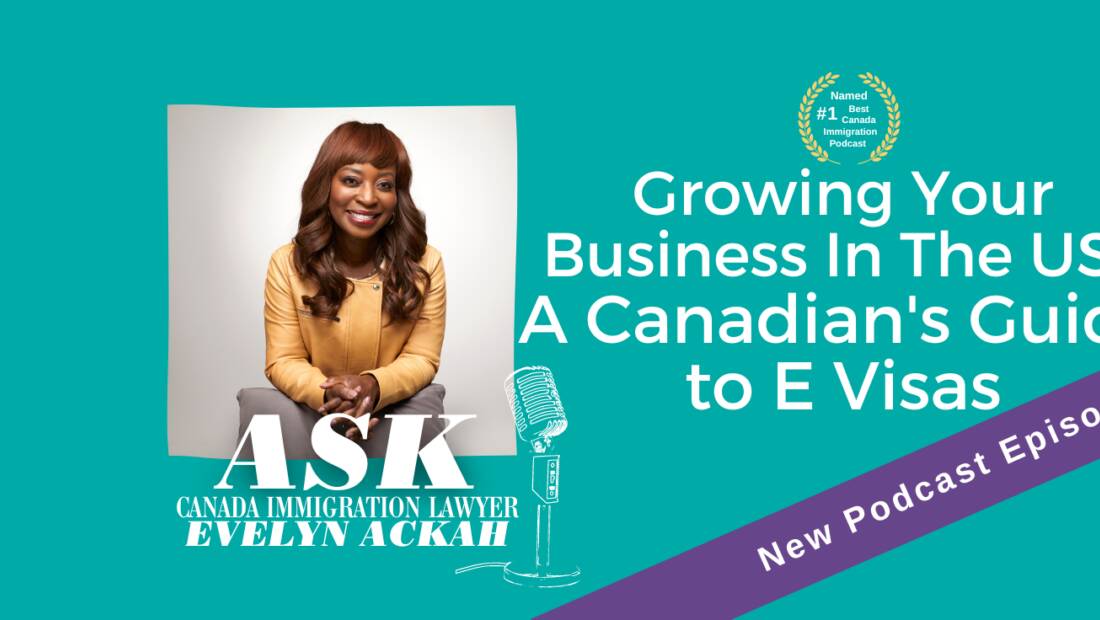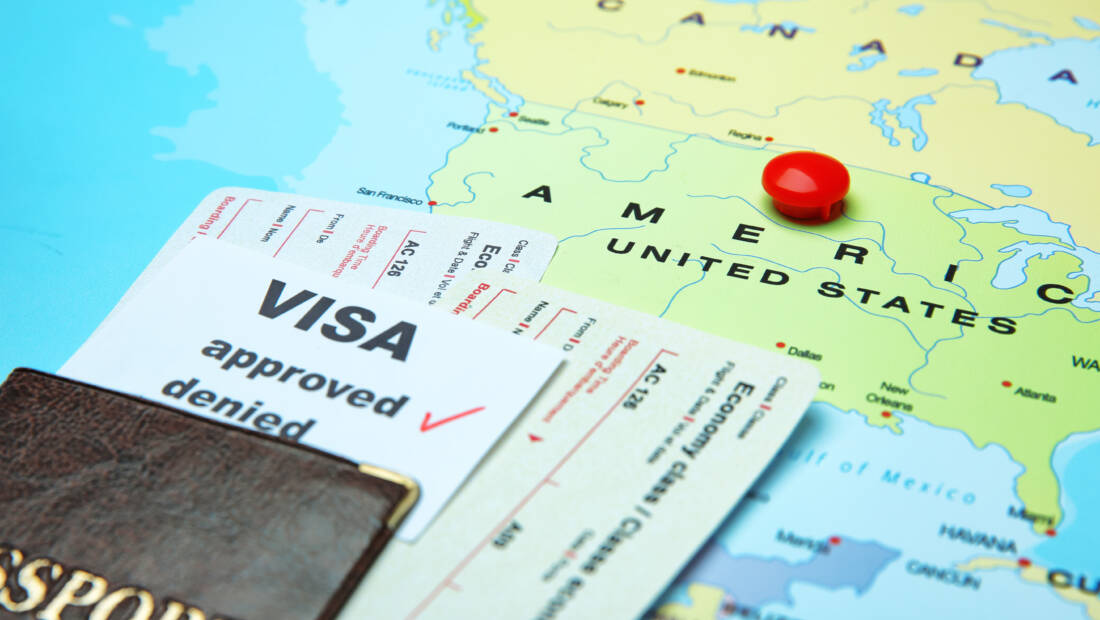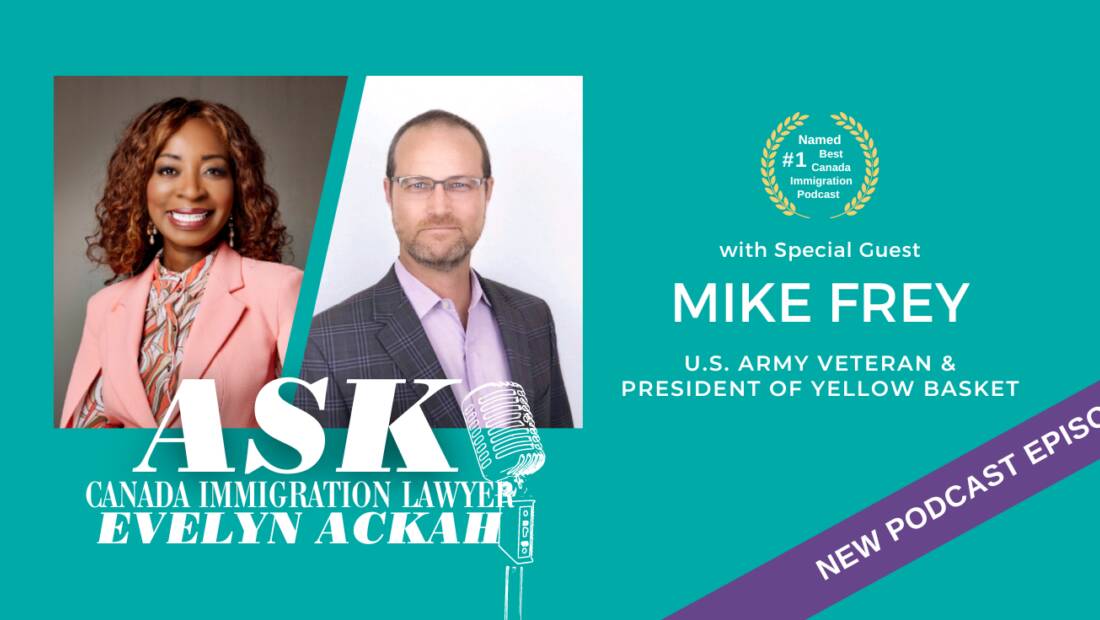Or listen on your favourite podcast app
Calgary immigration lawyer Evelyn Ackah explains how Canadian business owners and entrepreneurs can qualify for an E visa to grow their business in the United States.
The E Visa program provides a streamlined process for Canadians to obtain a U.S. work permit. An E visa is a type of nonimmigrant visa that is available to individuals who wish to enter the United States for a temporary period of time to engage in specific business activities. E visas are intended for individuals who are treaty traders or investors, and are only available to citizens of countries with which the United States has established treaties of commerce and navigation.
There are two types of E visas: E-1 visas and E-2 visas.
BOOK YOUR FREE CASE EVALUATION
If you are interested in growing your business in the United States with an E visa, I encourage you to listen to my podcast. In this podcast, I will discuss the following topics:
- the differences between an E-1 and an E-2 visa
- what is a commerce treaty
- the requirements for a Canadian business owner to qualify for an E visa
- the processing of E visa applications through the Toronto Consulate
- moving employees to the U.S. on an E visa
- benefits of being a Canadian citizen when applying for an E visa

About Evelyn Ackah
Evelyn Ackah is the Founder and Managing Lawyer at Ackah Business Immigration Law. We work with individuals and business owners from all over the world who want to cross borders seamlessly. For more information on immigration to Canada or the United States, Ask Evelyn Ackah at Ackah Business Immigration Law today at (403) 452‑9515 or email Evelyn directly at contact@ackahlaw.com.
The Ask Canada Immigration Lawyer Evelyn Ackah podcast by Calgary Immigration Lawyer Evelyn Ackah was named #1 Best Canada Immigration Podcast in 2022 by Feedspot.
BOOK YOUR FREE CASE EVALUATION
Transcript
Evelyn Ackah:
Good day everyone. Welcome to our LinkedIn Live for Ackah Business Immigration Law. Today we're going to be speaking about how to grow your business in the United States using the E1 and E2 visa categories. So if you are running currently a business or doing business cross border, you may be eligible for an E1 or an E2 based on your business activity. The most important thing is that you must be a Canadian citizen, because it's based on citizenship. There are other treaties with other Es with people from other countries of different citizenship, but we're going to focus today only on Canadian citizens and the treaty relationship with the United States that allows for the E1 and E2. So what are the requirements for an E1 visa? I'm going to really go through these in details, so I'm going to be reading a little bit.
The requirements for an E1 visa are that at least 50% of the volume of trade carried out must be between the United States and Canada and the designated treaty country. So that's between Canada and the United States, for Canadian treaty visa people. Must be at least 50% of trade. That's cross border. The other piece is that the visa holder must show that they intend to do and engage in substantial trade, which is not strictly defined. So it can't be like I just have or two contracts in the States. You won't qualify for the E under that E1 category. And that the visa holder must be a national of one of the treaty countries. So again, Canada is a treaty country that has an established E1 program with the United States. The trade can be in the form of physical movement of goods, transportation, or nonphysical services including banking, insurance, tourism, technology, or journalism.
And as with US visa terms, the applicant should be prepared to provide evidence that they intend to return to their home country at the end of the visa period. So let's just stop and pause for a minute. The E1 category we use for clients, some of our clients are cross-border executives who do business, who run their business in Canada, but have a number of US clients. It allows them to be in the States and they get a five year visa to be able to do this. Either they can live in the States or they can be cross border.
So that's the benefit, really, of having the E1, is that you don't have to deal every time with what are you doing when you go into the States. They know that you have business activity and that you're essentially working. You can live in the States for five years under an E1 or you can be cross border. We have clients who do executive coaching, who run businesses, who do conferences, who do training, as well as people who do other types of industry. Everything from oil and gas to other areas like that. So the E visa is really useful for those that are interested to do more and more business and grow their Canadian business in the US. The biggest part of it is that there must be that ownership of at least the majority in the person that's getting the first E1, and that the 50% of the enterprise must be the hands of the people.
So at least 50% of the business must be owned by a Canadian. You cannot have the business be owned 100% by a US entity and qualify, or even 55%, because it's based on citizenship. Very, very important. So the way the Es usually work is once the company gets that approval, the first E1, then let's say if they want to bring in other employees under them, they're able to get a bit of less of an onerous review and having the individual qualify for the E under them and after them. We have a client right now who got the first one during COVID and then was able to get the remainder three or four Es for their executive managerial specialized knowledge workers under the E category as well. But it was much easier because the initial E1 had already been approved on behalf of the company.
The other thing I want to talk to you about is something called the E2, which is an E2 investor visa. This is different from doing business with clients in the States under the E1. The E2 is an investor visa that allows Canadians who have citizenship, so again, not for permanent residents, to be able to invest significant funds in the United States for the purpose of setting up a business, a practice, or an office. It does not provide residency such as green card, but one of the greatest advantages of the E2 is that it can be extended indefinitely for as long as the business concerned is viable and active.
So to be eligible for the E2, the investor must demonstrate that their sole purpose for wanting to enter the United States is to run or develop the enterprise that they're investing in, and they have to be able to show where the funds came through. They have to show that the funds were gained legally, and that they have to show how the funds moved. You cannot simply invest in real estate in the United States and qualify for an E2. That's really important. The investment can either be into a new company for the E2 or an existing company. However, the investment cannot be used to create a job solely for the individual investor. The plan is that you're creating jobs for Americans.
And the investment also must not be viewed as marginal. It must have a good chance of generating sufficient income to provide for the visa holder and any family members within five years of entering the United States, and that the investor or business must have its own premises. You cannot run it from your home. So a real estate investment doesn't fit into this area. So the real difference between the E1 and the E2 is that there are differences in terms of what you're doing, and if you're creating jobs for Americans or you're simply doing business cross border. That's the real difference. The E1 is to do business in the US cross border. The E2 is to invest a substantial amount of funds into the US business. We always say that the minimum is at least 150 to 200,000, and you have to be able to show where the funds came from. There has to be that complete chain of activity. So it's very important that you be able to show that.
If you'd like to learn more about the E1 and the E2, we'd be happy to talk to you and do a consultation with you. One thing I want to say is the process isn't fast for either E1 or E2 because this is not a port of entry application like it is for Canadians who are doing TNs and L1s at the port of entry. The E visa applications are processed through the Toronto Consulate, the US consulate based in Toronto, and it could take three to six months right now based on their current processing times to get that appointment after you've submitted your application. We just had one of our clients go to Toronto and get approved yesterday for an E1, and it's her third E1 for her cross border business that is growing significantly. So it does take time and you need to know their scrutiny, much more scrutiny because you're sitting in front of an E visa officer. They're reviewing all your materials in advance, and then you go for the interview.
For subsequent employees, once you have that first E1 or E2, you don't have to go to Toronto for the interview if you're based, let's say, in Vancouver or Calgary. You can be processed at the US Embassy or consulate in the local city that you're in if there is one. So it saves some money on the travel time. If you'd like to learn more about how you can grow your business in the United States, please call us. There are real benefits to being a Canadian citizen to allow you to do this visa across the border, and as I said, they're for five years and they're renewable if you can show that the business continues to operate. I hope this information has been helpful to you. If you'd like to learn more about the category, give us a call at Ackah Business Immigration Law. We'd love to help you. Thank you so much, have a great day. Bye-bye.












